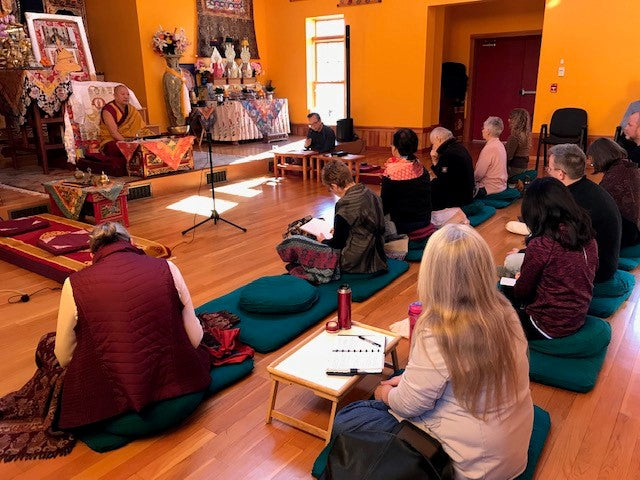2024 SPRING SEMESTER CLASS SCHEDULE: February 12 to May 2, 2024
Couldn't load pickup availability
|
2024 SPRING SEMESTER CLASS SCHEDULE:
Namgyal Zoom Classes: Namgyal will host all spring classes by Zoom. Audio recordings of the Zoom session for a class will be available for download the next day or two after class. The cost for Zoom class access is $200. To register for classes, contact office@namgyal.org. Payments can be made by check or online through the Namgyal website: www.namgyal.org OR Send a Check in the name of Namgyal Monastery, 201 Tibet Sr, Ithaca, NY 14850. Senior Citizen Discount: A discount of 15% will be granted to seniors (age 65 or older), applicable to full-time tuition or tuition for individual classes.
1. Buddhist Science and Philosophy: Volume 4- Philosophical Views: The Two Truths Mondays: February - 12, 19, 26, March- 4, 11, 18, 25 April - 1, 8, 15, 22, 29 Time: 6:30 pm to 7:45pm Tuition: $200 for semester (payable in full or in two $100 installments) For over 25 years, His Holiness the XIV Dalai Lama has engaged in annual Mind-Life Conferences with Western scientists from various disciplines to explore the commonalities and differences in Buddhist and Western views on the nature of reality and the mind. One outcome of these discussions is that HHDL convened a group of renown Buddhist scholars (Geshes) to compile all the treatises from classical Indian Buddhists texts that provide discourses on Buddhist science and philosophy. The fourth volume in this series provides a compilation and synthesis of teachings on the Indian Buddhist philosophical teachings. In this class, Geshe-la will provide teachings on Part One of this volume which focuses on explanation of the two truths from the perspectives of different philosophical schools. Understanding the two truths: conventional truth and ultimate truth, is essential to developing a comprehensive view of wisdom realizing emptiness within Buddhist philosophy. Each philosophical school asserts conventional and ultimate truths and their relationship in specific way. Understanding each of these and their differences assists the student in developing an ever deeper and more subtle view of emptiness. Geshe-la will provide commentary on this section to help students better understand how conventional and ultimate truths are posited by the different philosophical schools and their specific assertions. This is an excellent opportunity for students new to Buddhism to be introduced to foundational philosophical concepts and for more experienced students to further deepen their understanding and practice. Text: Science and Philosophy in the Indian Buddhist Classics Vol. 4: Philosophical Topics Conceived and Introduced by His Holiness the Dalai Lama, Edited by Thupten Jinpa
2. Lam Rim (Stages of the Path to Enlightenment): Lamp of the Path to Enlightenment Tuesdays: February - 13, 20, 27 March - 5, 12, 19, 26 Aptil - 2, 9, 16, 23, 30 Time: 6:30 pm to 7:45pm Stages of the Path (Lam Rim) texts are a genre of teaching in Tibetan Buddhism that provide a systematic overview of all the practices necessary for the attainment of enlightenment. Such texts cover all the scopes or levels of teachings and practices that are essential to a practitioner’s gradual and sustained development on the path. The foundational teachings and practices of the initial scope include contemplating the preciousness of this human life, reflecting on impermanence and going for refuge. Middling scope teachings include reflections on karma, the twelve-dependent links of dependent origination and the aspiration for personal liberation from cyclic existence (samsara). Finally, teachings on the great scope of the bodhisattva path include generation the mind of awakening (bodhichitta), cultivation of the wisdom realizing emptiness and the practice of the six perfections. This semester Geshe-la will provide teaching on the Lamp for the Path to Enlightenment by Atisha. Atisha was one of the Seventeen Nalanda Masters and this text is considered the first lam rim style text. This is an excellent teaching for students at all levels of experience as it will provides a clear framework to newcomers for understanding the stages of the path and it will help deepen understanding and practices for more experienced students. There are several translations of this text that can be downloaded from the internet. Root Text: https://studybuddhism.com/en/tibetan-buddhism/original-texts/sutra-texts/lamp-for-the-path-to-enlightenment
3. Practice and Repetition of Guru Avalokiteshvara (Buddha of Compassion) Instructor: Geshe Jamyang Dakpa translation by Palden Oshoe Wednesdays: February - 14, 21, 28 March - 6, 13, 20, 27 April - 3, 10, 17, 24, May - 1 Time: 6:30 pm to 7:45pm Tuition: $200 for semester (payable in full or in two $100 installments)
One of the most important aspects of deity yoga practice is understanding and seeing/experiencing the inseparability of one’s guru (teacher) and meditational deity. Through seeing the guru as indivisible from the deity one deepens their connection with the inspiration and teachings received from their guru and thereby strengthens development of the enlightened qualities of the deity. During this class, Geshe-la will provide an overview and instructions on a sadhana practice composed by His Holiness the 14th Dalai Lama: The Sadhana of the Inseparability of the Spiritual Master and Avalokiteshvara. This is an exceptionally special sadhana text as His Holiness is considered a manifestation of Avalokiteshvara, the Buddha of Compassion. Geshe la received transmission and commentary of this practice directly from His Holiness. Geshe la will provide extensive explanation on the different sections of the practice including visualizations and mantra repetition. The weekend intensive in April will be scheduled as a practice retreat in which students will have the opportunity to recite and practice this sadhana together. As always Geshe-la will provide ample time for questions and discussion to assist students at all levels in cultivating a deeper understanding of this important practice. A copy of the sadhana will be provided to students who register for the class.
4. Introduction to Tibetan Buddhism Part 3.2: Liberation from Cyclic Existence Instructor: Deana Bodnar Time: 6:30pm to 7:45pm This course focuses on reading and discussion of the book series written by His Holiness 14th Dalai Lama and American Buddhist Nun, Thubten Chodron. During this semester we will review the second half of the third volume which provides an excellent overview of important concepts and principles in Buddhism related to the process by which beings continue to revolve in cyclic existence and then how to gain liberation and experience the peace of nirvana. Topics covered this semester include: 1) Revolving in Cyclic Excistence; 2) Dependent Origination; 3) The Determination to be Free; 4) Seeking Genuine Peace; 5) Freedom from Cyclic Existence; 6) The Mind and its Potential and 7) Buddha Nature. The goal of the course is to give students a basic framework for understanding different teachings and practices within Buddhism and explore how we can integrate them into our daily lives to support our spiritual development. Each class will also provide time for questions and discussion about these topics as well as time for meditation practice. Required Reading: Samsara, Nirvana and Buddha Nature, The Library of Wisdom and Compassion Volume 3 by His Holiness the 14th Dalia Lama and Thubten Chodron (Wisdom Publications) Deana Bodnar has been a student and practitioner of Tibetan Buddhism at Namgyal Monastery for over 20 years. She has previously taught classes on the Neurobiology of Meditation. |


